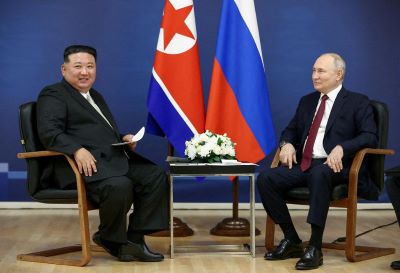Context
The rapid transformation of Russia-North Korea ties has emerged as a significant development in international relations, particularly amidst escalating tensions in the Korean peninsula. This shift in dynamics between Moscow and Pyongyang has been underscored by a series of diplomatic engagements and strategic collaborations, culminating in high-level visits and agreements between the two nations. Against the backdrop of Russia's strained relations with the West following its invasion of Ukraine, and North Korea's quest for economic development amid international sanctions, the deepening ties between the two countries have far-reaching implications for regional stability and global geopolitics.
Warming Ties and Strategic Collaborations:
Historically, Russia and North Korea maintained diplomatic ties during the Cold War era, primarily driven by shared ideological affinities as communist states. However, the geopolitical landscape shifted over the years, leading to fluctuations in their relationship. In recent times, there has been a noticeable warming of ties between Moscow and Pyongyang, manifested in diplomatic engagements and strategic collaborations. This thaw in relations gained momentum following Russia's invasion of Ukraine in 2022, which strained Moscow's international ties and prompted a reevaluation of its foreign policy priorities.
The pace and depth of engagement between Russia and North Korea accelerated significantly in 2023, marked by high-level visits and agreements aimed at deepening cooperation across various sectors. A key milestone was the visit of a Russian delegation led by Defence Minister Sergei Shoigu to Pyongyang in July 2023, followed by North Korean leader Kim Jong-un's subsequent visit to Moscow in September 2023. These visits paved the way for further bilateral engagements, with both countries preparing for a summit between their leaders in 2024.
Energy Collaboration and Economic Development:
Energy collaboration has emerged as a crucial aspect of the partnership between Russia and North Korea. Russia has been a key supplier of fuel to North Korea, and discussions have been underway to explore further cooperation in the energy sector. Additionally, infrastructure projects such as the Rajin-Khasan railway linking Russia to North Korea's Rajin port have underscored efforts to bolster economic cooperation between the two countries. North Korea, grappling with economic challenges and international sanctions, sees Russia as a potential partner for development in sectors such as energy and transportation, as well as in addressing chronic food shortages.
The utility of bilateral agreements, such as a reported food-for-arms deal, is evident in the tangible benefits it offers to both parties. Satellite images tracking freight railcar traffic at the Tumangang rail facility near the North Korea-Russia border have pointed to North Korea's transfers of ammunition to Russia, highlighting the mutually beneficial nature of the partnership. Moreover, the deepening economic ties between Russia and North Korea have the potential to enhance regional stability and contribute to the development of both countries' economies.
The American Factor and Regional Security:
Another factor contributing to the rapprochement between Russia and North Korea is the shared challenge posed by the United States and its allies in the region. Both countries have faced varying degrees of strain in their relations with the West, prompting a pragmatic recalibration of their foreign policy priorities. Moscow perceives engagement with North Korea as a means to influence the broader security landscape in Northeast Asia and counterbalance the influence of the United States and its allies in the region.
Diplomatic initiatives undertaken by Russia, often in collaboration with China, underscore a desire to shape regional security architecture independently of Western influence. The potential for powerful ties between Moscow and Pyongyang to offset U.S.-led efforts to strengthen alliances with countries like Japan and South Korea has been acknowledged by North Korean Foreign Minister Choe Son-hui. This strategic alignment between Russia and North Korea reflects a broader trend of emerging partnerships aimed at reshaping the geopolitical landscape in Northeast Asia.
Conclusion:
The rapid transformation of Russia-North Korea ties represents a significant development in international relations, with far-reaching implications for regional stability and global geopolitics. The warming of relations between Moscow and Pyongyang, accelerated by high-level visits and strategic collaborations, underscores the mutual interests and shared challenges faced by both countries. Energy collaboration, economic development initiatives, and efforts to counterbalance the influence of the United States and its allies in the region have emerged as key drivers of the partnership between Russia and North Korea.
As both nations deepen their engagement and cooperation across various sectors, their relationship is likely to exert a significant influence on the dynamics of the Korean Peninsula and the broader Northeast Asian region. The strategic alignment between Russia and North Korea reflects a broader trend of emerging partnerships aimed at reshaping the geopolitical landscape in Northeast Asia. In the years to come, the evolving relationship between Russia and North Korea will continue to shape regional dynamics and influence global geopolitics.
|
Probable Questions for UPSC Mains Exam
|
Source – The Hindu







